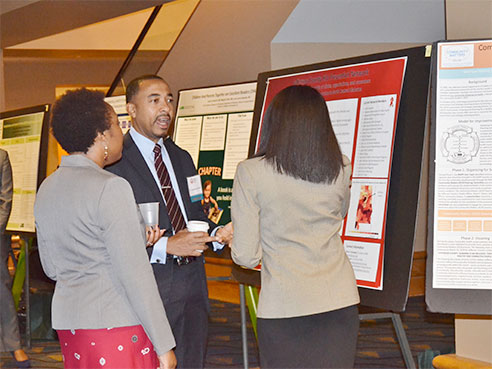Media Contact: Bob Shepard, shep@uab.edu
 Keynote speaker Sampson Davis, M.D., tours the poster session.The second annual Community Engagement Institute enjoyed an overflow crowd for the daylong education and training event designed to benefit both community and academic partners.
Keynote speaker Sampson Davis, M.D., tours the poster session.The second annual Community Engagement Institute enjoyed an overflow crowd for the daylong education and training event designed to benefit both community and academic partners.
The event, held Oct. 2 at the Birmingham-Jefferson Convention Complex, was organized by the University of Alabama at Birmingham Center for Clinical and Translational Science’s One Great Community Council and the UAB Center for the Study of Community Health’s Jefferson County Community Participation Board.
Author and physician Sampson Davis, M.D., addressed the more than 250 individuals in attendance about the importance of family and community support in cultivating personal success. Davis returned to his hometown of Newark, New Jersey, after graduating from medical school where he and two of his high school friends — who also became doctors — started an organization called The Three Doctors. Their goal is to spread the word of health, education and youth mentoring, and become “the Michael Jordan of education,” so that learning becomes a glamorized trend throughout all communities.
In the afternoon, Al Richmond, MSW, executive director, Community-Campus Partnerships for Health, shared some of what he has learned in his more than 25 years in a career that uniquely blends social work and public health to address racial and ethnic health disparities.
“This event is setting the stage for enhanced community engagement, for learning about what people can do in their own communities, as well as displaying the diversity of resources available at UAB,” Richmond said.
This year’s CEI event was free to the public, and attendance more than doubled from last year. Attendees represented members of more than 100 Greater Birmingham faith-based organizations, universities, government and nonprofit agencies, local and state health department representatives, community organizers, city and county officials, and representatives from the National Institutes of Health and the Environmental Protection Agency.
| The CEI’s breakout sessions touched on three topics: activism, advocacy and community organizing; structural racism and community health; and ways to fully involve communities in collaborative research. |
The CEI’s breakout sessions touched on three topics: activism, advocacy and community organizing; structural racism and community health; and ways to fully involve communities in collaborative research.
New this year, the CEI poster session featured more than 30 posters on a diverse array of public health topics, including domestic violence and HIV awareness and prevention programs, and other projects dedicated to tackling tough local public health issues. Event attendees were encouraged to network and receive a directory of all attendees’ names to facilitate future collaborations.
Max Michael, M.D., dean of the UAB School of Public Health, emphasized the importance of working to foster collaborations between higher education institutions and their larger communities.
“The momentum for this event continues to grow,” Michael said, “and reflects the desire by our Greater Birmingham community members from a broad range of organizations to have a platform to engage in meaningful conversations about how we can improve our communities’ public health.”
“We continue to be encouraged by the response to this important event, which highlights the deep knowledge, experience and talent in our communities,” said Shauntice Allen, Ph.D., director of One Great Community. “We plan to harness the momentum the CEI generates to work toward achieving, and maintaining, improved health outcomes for our community as a whole.”
Videos of Davis’ and Richmond’s talks, as well as photos of the event, are available on the CEI website, www.uab.edu/ccts/community/cei.